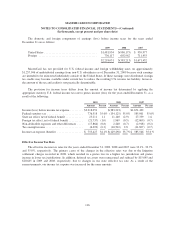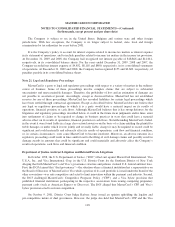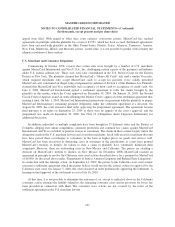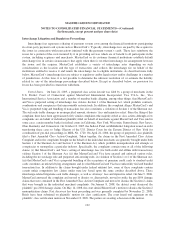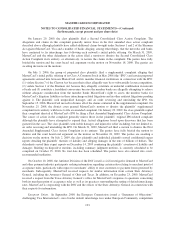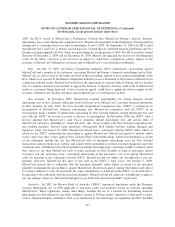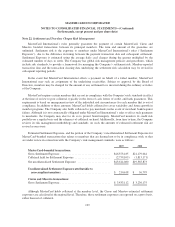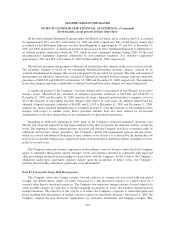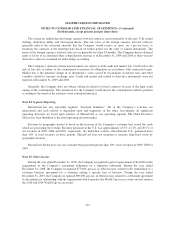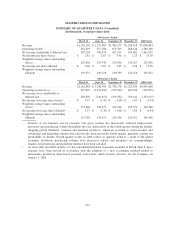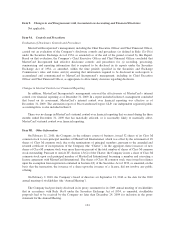MasterCard 2009 Annual Report Download - page 135
Download and view the complete annual report
Please find page 135 of the 2009 MasterCard annual report below. You can navigate through the pages in the report by either clicking on the pages listed below, or by using the keyword search tool below to find specific information within the annual report.MASTERCARD INCORPORATED
NOTES TO CONSOLIDATED FINANCIAL STATEMENTS—(Continued)
(In thousands, except percent and per share data)
about, among other things, the nature of the empirical proof it would require for MasterCard to establish other
default cross-border interchange fees consistent with the decision and so as to understand more fully the
European Commission’s position as to how it may comply with the decision. MasterCard requested an extension
of time to comply with the decision and, on April 26, 2008, the European Commission informed MasterCard that
it had rejected such request. On June 12, 2008, MasterCard announced that, effective June 21, 2008, MasterCard
would temporarily repeal its then current default intra-EEA cross-border consumer card interchange fees in
conformity with the decision. On October 17, 2008, MasterCard received an information request from the
European Commission in connection with the decision concerning certain pricing changes that MasterCard
implemented as of October 1, 2008. MasterCard submitted its response on November 13, 2008.
On March 30, 2009, MasterCard gave certain undertakings to the European Commission and, in response,
on April 1, 2009, the Commissioner for competition policy and DG Competition informed MasterCard that,
subject to MasterCard’s fulfilling its undertakings, they do not intend to pursue proceedings for non-compliance
with or circumvention of the decision of December 19, 2007 or for infringing the antitrust laws in relation to the
October 1, 2008 pricing changes, the introduction of new cross-border consumer default interchange fees or any
of the other MasterCard undertakings. MasterCard’s undertakings include: (1) repealing the October 1, 2008
pricing changes; (2) adopting a specific methodology for the setting of cross-border consumer default
interchange fees; (3) establishing new default cross-border consumer interchange fees as of July 1, 2009 such
that the weighted average interchange fee for credit card transactions does not exceed 30 basis points and for
debit card transactions does not exceed 20 basis points; (4) introducing a new rule prohibiting its acquirers from
requiring merchants to process all of their MasterCard and Maestro transactions with the acquirer; and
(5) introducing a new rule requiring its acquirers to provide merchants with certain pricing information in
connection with MasterCard and Maestro transactions. The undertakings will be effective until a final decision
by the General Court of the European Union regarding MasterCard’s application for annulment of the European
Commission’s December 19, 2007 decision.
Although MasterCard believes that any other business practices it would implement in response to the
decision would be in compliance with the December 19, 2007 decision, the European Commission may deem
any such practice not in compliance with the decision, or in violation of European competition law, in which case
MasterCard may be assessed fines for the period that it is not in compliance. Furthermore, because a balancing
mechanism like default cross-border interchange fees constitutes an essential element of MasterCard Europe’s
operations, the December 19, 2007 decision could also significantly impact MasterCard International’s European
customers’ and MasterCard Europe’s business. The European Commission decision could also lead to additional
competition authorities in European Union member states commencing investigations or proceedings regarding
domestic interchange fees or, in certain jurisdictions, regulation. In addition, the European Commission’s
decision could lead to the filing of private actions against MasterCard Europe by merchants and/or consumers
which, if MasterCard is unsuccessful in its application for annulment of the decision, could result in MasterCard
owing substantial damages.
United Kingdom Office of Fair Trading. On September 25, 2001, the Office of Fair Trading of the United
Kingdom (“OFT”) issued a Rule 14 Notice under the U.K. Competition Act 1998 challenging the MasterCard
default interchange fees and multilateral service fee (“MSF”), the fee paid by issuers to acquirers when a
customer uses a MasterCard-branded card in the United Kingdom either at an ATM or over the counter to obtain
a cash advance. Until November 2004, the interchange fees and MSF were established by MasterCard U.K.
Members Forum Limited (“MMF”) (formerly MasterCard Europay U.K. Ltd.) for domestic credit card
transactions in the United Kingdom. The notice contained preliminary conclusions to the effect that the
MasterCard U.K. default interchange fees and MSF infringed U.K. competition law and did not qualify for an
exemption in their present forms. On February 11, 2003, the OFT issued a supplemental Rule 14 Notice, which
125



